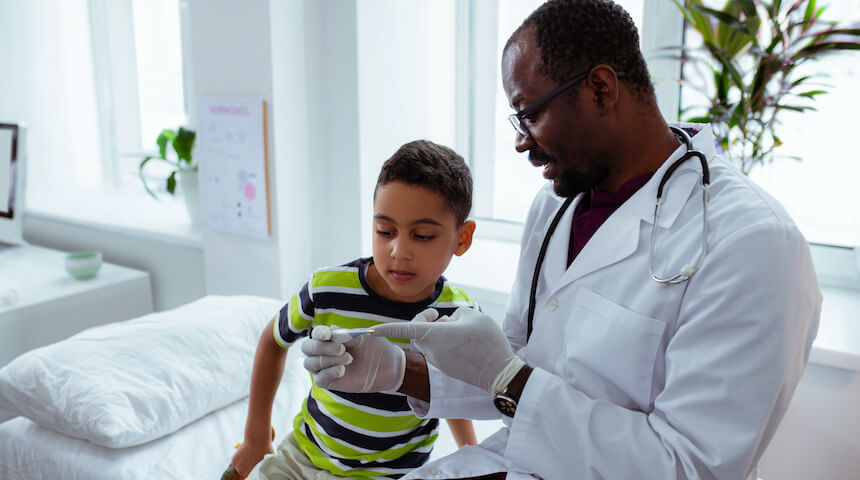Answers to 4 Common Follow-Up Questions Parents Ask
A parent often will be worried about their child’s sickness, even following a visit to the doctor’s office. They might wonder why they never received medication, for example, or why their condition seems to worsen before it gets better. These are valid concerns that we do not take lightly.
Physicians aim to arm families with all they should need to make their child more comfortable. If their condition is not progressing as we expect it to, their children deserve to be reevaluated. If parents are uncomfortable with their diagnosis, they should always call us so we can help resolve those concerns.
Here are four follow-up questions I hear the most:
Why Didn’t I Receive Medication?
While it depends on the diagnosis, if your child has an illness caused by a virus — such as a cold or an upper-respiratory infection, for instance — no antibiotics are prescribed. This can be confusing, but your son or daughter will get better over time. For viral illnesses, the worst days may not be the first two days after your child is sick, but often the third, fourth or fifth days after the sickness starts. It gets worse before it gets better. It can take up to two to three weeks before a child completely recovers.
Even without prescriptions, it’s important to follow all recommendations. It is the rest, fluids and nutrition that often help with the illness so a child can get better faster. Staying on top of those will speed the recovery process.
Is This a Fever or Not?
A true fever is a temperature of 100.4 or higher. In children aged two months or older, we’re generally less concerned about the number than we are about how the child is acting. Fevers shouldn’t be scary; they’re the body’s way of fighting an infection.
Make certain you’re using the proper amount of acetaminophen or ibuprofen (if instructed to do so) and also that you’re using a thermometer to determine whether they actually have a fever in the first place. Time, rest, regular fluids and other supportive care will be your best defenses.
If they are vomiting or have diarrhea, my recommendation is the same — if they are able to stay hydrated, there is less reason to be concerned. Many parents won’t know that a typical sickness will run its course; they’ll just know that their kids aren’t feeling 100 percent right. One of the reasons we are here is to walk them through it, helping explain and making certain they understand.
When Is My Child no Longer a Threat to Others?
Generally, if they haven’t had a fever for at least 24 hours, they’re no longer considered contagious. If they have a fever for over 3-4 days, however, you should return to the doctor. If the fever has been over a certain temperature for five days or more, we are more concerned.
If your child is feverish, make certain they wash their hands at home, not sharing any cups or towels. Wash your linens and toys in hot water once they recover so germs are no longer part of the environment. This is helpful in preventing it from spreading.
Make a point of changing out their toothbrushes as well as the toothpaste tube used. When we brush our teeth, we tend to wipe the toothbrush along the top of the tube. A child doesn’t need to change out their toothbrush until a fever is gone, but if the whole family is using the same tube, they run the risk of infection.
What if They’re not Getting any Better?
Call the doctor’s office if the condition worsens or persists. We respond to any questions you have on the same day you call. Do call when you feel it’s needed. If improvements aren’t going according to plan, your child deserves to be seen again.
If a child is given medication and instructed to take it for 10 days, it’s important to do so for all 10 days. It’s the only way to know if a true bacterial infection has been fully treated.
Always follow up if instructed. Many times the child seems to feel better, so parents won’t do so. It is important to follow up with a primary care physician because there may be a reason for them to get checked again. For example, did the upper-respiratory infection actually get better or is it a continual event? It’s challenging to understand if they don’t follow up.
Follow-Up Visits Happen
Viruses take time to go away completely. With proper rest, hydration and nutrition, the body will fight off the infection. Medication won’t allow that sickness to go away faster. Still, if a parent is concerned — if their child can’t keep fluids down or if they have no energy, for example — they should listen to their instincts. If an illness is not improving, they are their child’s best advocates. There’s nothing wrong with being diagnosed a second time. Parents know their children best.
The resulting diagnosis isn’t always quite what you hope for or expect, but if it’s not following the pattern you were told it would or if it is following that pattern but you are still worried, it’s better to ask questions and have the child seen once more. There is a chance something else may actually be happening.
Are You Interested in Learning More?
Sign up for our e-newsletter for more tips and best practices from pediatricians.
Sign Up Here









